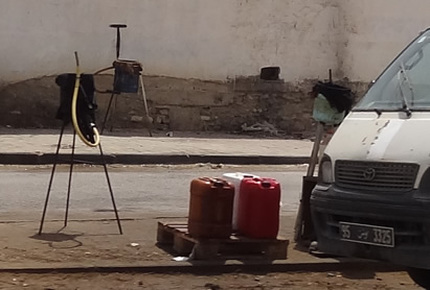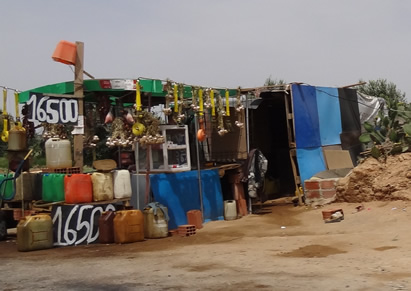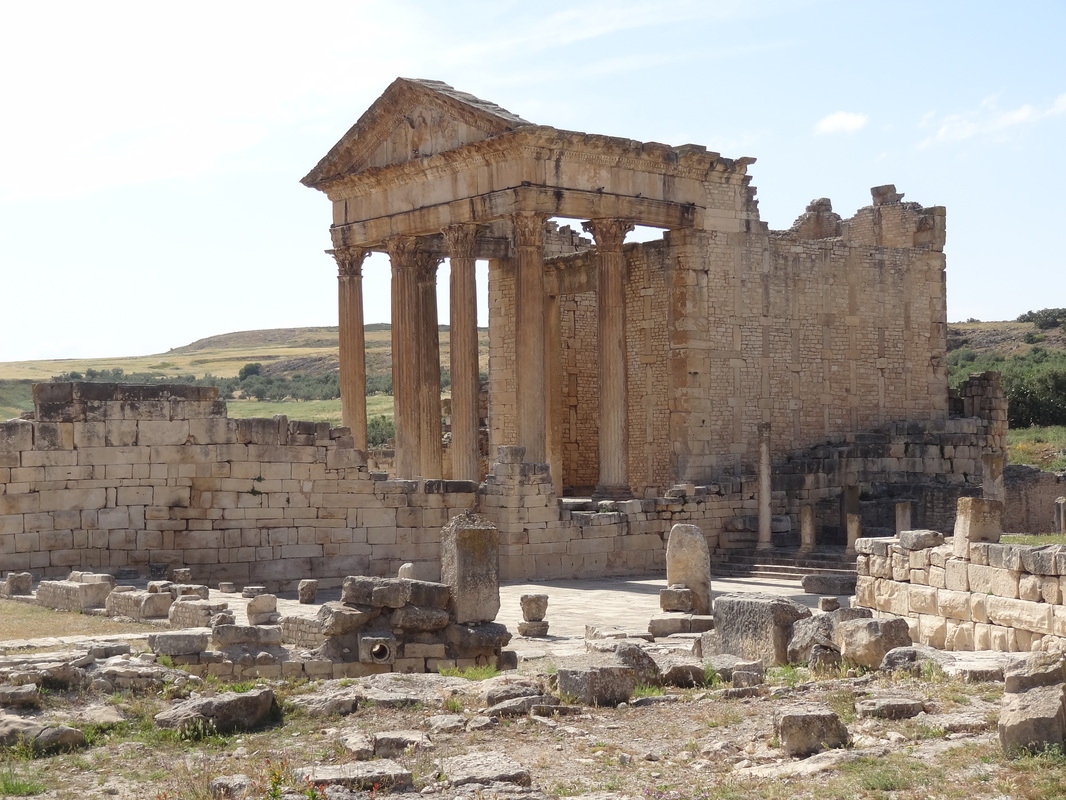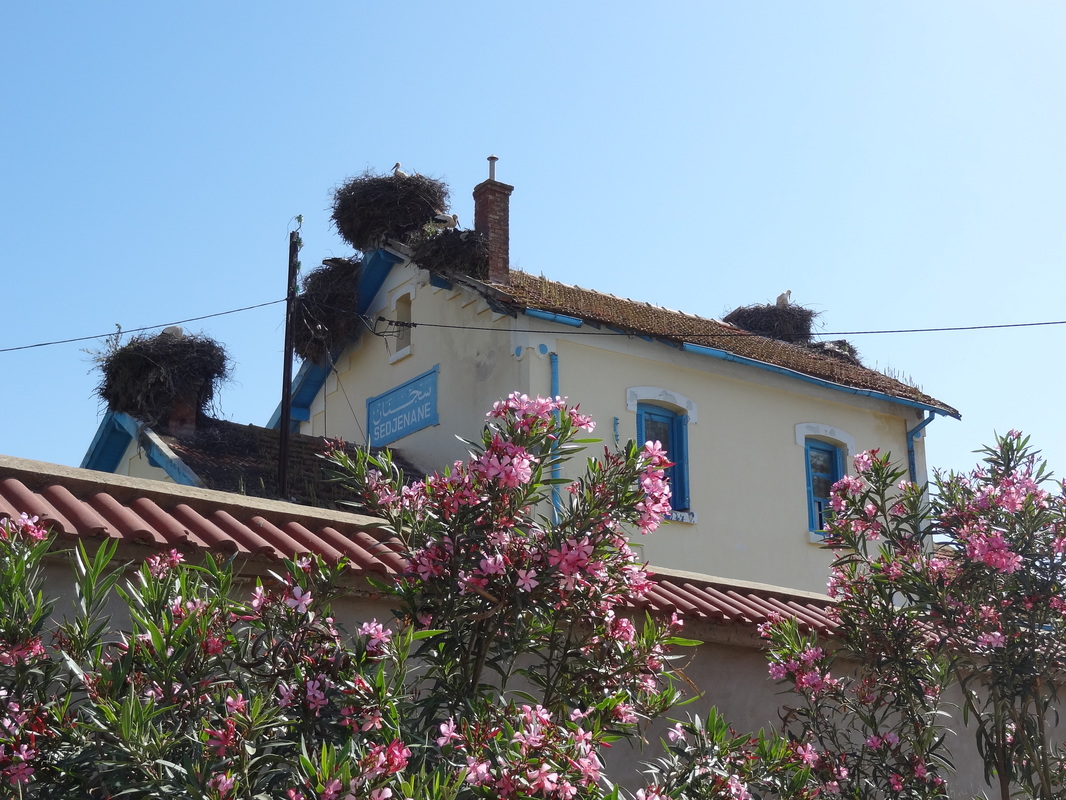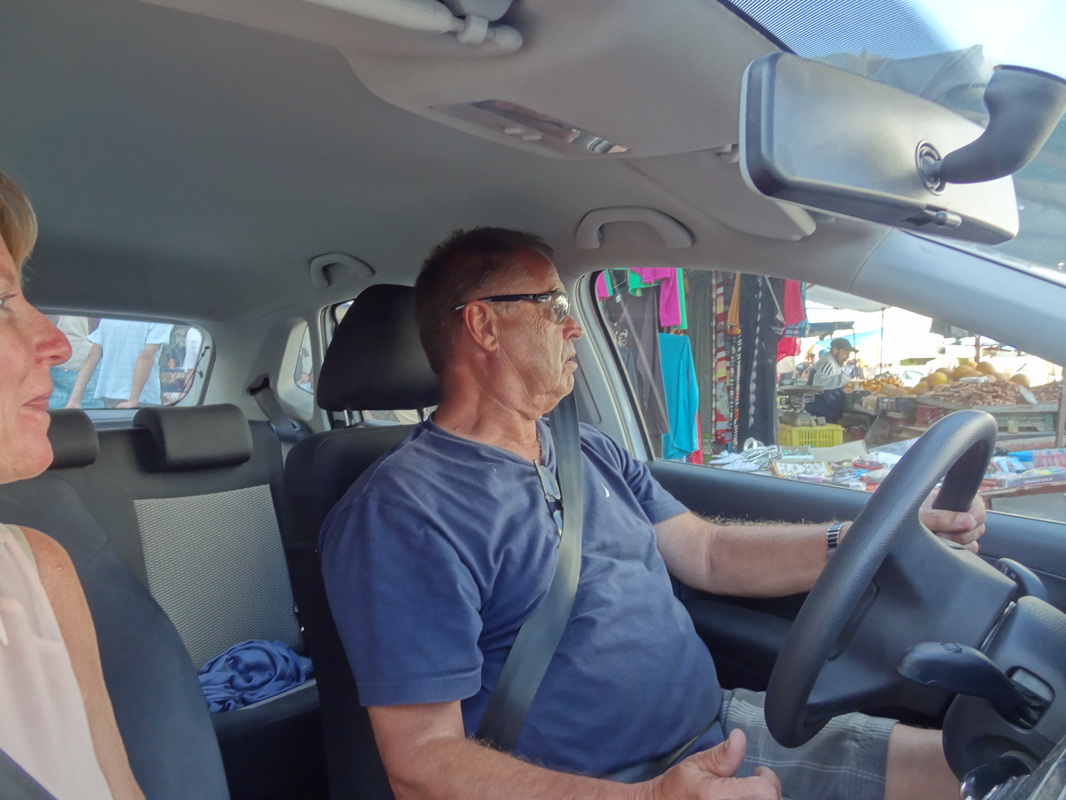Central Tunisia – Spring 2013
Trip into Central Tunisia
May 15 -18, 2013 -- Four day driving adventure through central Tunisia
Background: In the news
We learned while touring Central Tunisia mid-May, that we were traveling in a new Al-Qaeda terrorist territory. Just days before we were there, the government had shelled this group and they returned fire with loss of life and limbs. The location of the shelling was just outside Kasserine, near the Algerian border where we'd stopped for tea. This is the same group that has claimed responsibility in the January siege of the Algerian gas plant where 37 foreign hostages were killed. There are two groups being hunted, one in the Kef region made up of about 15 people and the other near Kasserine in the Mt. Chaambi region made up of about 20 people. Le Kef is where we stayed in the delightful bed and breakfast in a Tunisian home. The son spoke of a peaceful revolution coming, but this last incident would leave you to believe that more chaos has entered the region. Apparently, these terrorist groups are gathering weapons and storing them in the Mt. Chaambi region, turning it into their headquarters. The current "Brotherhood" Tunisian government and the Algerian government are working together to squash this. The Algerian border has been a place for easy smuggling, especially the Algerian gasoline, but now also weapons.
Trip into Central Tunisia
May 15 -18, 2013 -- Four day driving adventure through central Tunisia
Background: In the news
We learned while touring Central Tunisia mid-May, that we were traveling in a new Al-Qaeda terrorist territory. Just days before we were there, the government had shelled this group and they returned fire with loss of life and limbs. The location of the shelling was just outside Kasserine, near the Algerian border where we'd stopped for tea. This is the same group that has claimed responsibility in the January siege of the Algerian gas plant where 37 foreign hostages were killed. There are two groups being hunted, one in the Kef region made up of about 15 people and the other near Kasserine in the Mt. Chaambi region made up of about 20 people. Le Kef is where we stayed in the delightful bed and breakfast in a Tunisian home. The son spoke of a peaceful revolution coming, but this last incident would leave you to believe that more chaos has entered the region. Apparently, these terrorist groups are gathering weapons and storing them in the Mt. Chaambi region, turning it into their headquarters. The current "Brotherhood" Tunisian government and the Algerian government are working together to squash this. The Algerian border has been a place for easy smuggling, especially the Algerian gasoline, but now also weapons.
OUR JOURNEY:
We left the central-eastern coast (Monastir) for Sbeitla, our first stop, driving through the heart of Tunisia's Islamic holiest of regions. Sbeitla is in central northern Tunisia and the location of Roman ruins and the best preserved forum temples in Tunisia. Sbeitla was the entry point for the Muslim Conquest of Northern Africa and Southern Europe in 632 AD, following the death of Muhammed. This event tossed out the Byzantines.
Our car rental was assigned on "empty" fuel. Coasting to Sbeitla on fumes, we were on the lookout for a petro station, nothing. Now entering the large city of Kairouan we believed we'd spot one at any moment. After a few wrong turns and we were back on the highway again and still on "empty" passing dozens of jerry-can gas stations. Should we stop? The plastic jerry cans usually plopped on a stool with a gas saturated cloth on top and the price, 10 dinar cents less per litre than a regular service station. Finally, a gas station. We filled up.
Tarek, our B&B host on Day 2 shared that there are three ways the fuel is illegally transported over the Algerian border.
1. By driving a truck with petro-filled jerry cans over the border and the patrol shoots at you.
2. By driving a truck with petro-filled jerry cans over the border and you bribe the officer.
3. Load up your donkey with filled jerry cans and send him on his way, the donkey knows his way home.
Gas in the service station is 17500 dinar. (That's about a $1.10 CND).
We left the central-eastern coast (Monastir) for Sbeitla, our first stop, driving through the heart of Tunisia's Islamic holiest of regions. Sbeitla is in central northern Tunisia and the location of Roman ruins and the best preserved forum temples in Tunisia. Sbeitla was the entry point for the Muslim Conquest of Northern Africa and Southern Europe in 632 AD, following the death of Muhammed. This event tossed out the Byzantines.
Our car rental was assigned on "empty" fuel. Coasting to Sbeitla on fumes, we were on the lookout for a petro station, nothing. Now entering the large city of Kairouan we believed we'd spot one at any moment. After a few wrong turns and we were back on the highway again and still on "empty" passing dozens of jerry-can gas stations. Should we stop? The plastic jerry cans usually plopped on a stool with a gas saturated cloth on top and the price, 10 dinar cents less per litre than a regular service station. Finally, a gas station. We filled up.
Tarek, our B&B host on Day 2 shared that there are three ways the fuel is illegally transported over the Algerian border.
1. By driving a truck with petro-filled jerry cans over the border and the patrol shoots at you.
2. By driving a truck with petro-filled jerry cans over the border and you bribe the officer.
3. Load up your donkey with filled jerry cans and send him on his way, the donkey knows his way home.
Gas in the service station is 17500 dinar. (That's about a $1.10 CND).
In 2009, we traveled through a completely different Tunisia, pre-Arab Spring and the Brotherhood. Women were more progressive, wearing jeans, no head cover, and we were told, "No displays of religion allowed." There were no armed soldier and police presence was minimal. Today, we're seeing armed soldiers in towns, driving in army trucks, and police and soldiers spot checking vehicles in major intersections. How quickly the world can change.
The other common road-side sight is a sheep hanging with his brothers and sisters mulling around underneath. Or a sheep hanging from a branch and someone gutting and skinning it.
The land is very dry, but twice the sky darkened and sandy drops fell, but not enough to moisten the much-needed parched land. When it comes, we're told, it gushes filling the valleys quickly.
Arriving at our reserved hotel in Sbeitla the proprietor surprised, "No room here, you cannot stay." The big problem for us was that there were no other hotels in that town. I was greatly disappointed, and turned to leave. Con, however persisted saying, "We made a reservation, please check again." Each time the man said, "No room," Con just continued to stand there as if waiting for the key. Then, suddenly a key was granted, and we were given the "matrimonial bed." The room includes breakfast and dinner for a total of $CND75.
The land is very dry, but twice the sky darkened and sandy drops fell, but not enough to moisten the much-needed parched land. When it comes, we're told, it gushes filling the valleys quickly.
Arriving at our reserved hotel in Sbeitla the proprietor surprised, "No room here, you cannot stay." The big problem for us was that there were no other hotels in that town. I was greatly disappointed, and turned to leave. Con, however persisted saying, "We made a reservation, please check again." Each time the man said, "No room," Con just continued to stand there as if waiting for the key. Then, suddenly a key was granted, and we were given the "matrimonial bed." The room includes breakfast and dinner for a total of $CND75.
In this small town, Sebitla most women wear scarves. Five years ago, the scarves were banned in the workplace and in schools, but they're back now under Islamic rule.
The further into the countryside, the more the people stare at me with curiosity maybe? I'm dressed appropriately, Capri pants and long shirt (no sleeves no scarf). Even small children stare and if I wave they smile or giggle. Many teenage boys smile and offer friendly, "Bon jour" greetings. Today, while standing among the tables in an all-male coffee shop -- but they all are -- an old man brushed by me grabbing my bottom and gliding his hand around my hip. I shouted, "Hey!"
Many of the men looked up from their coffee and stopped talking to watch me. The old guy looked at me through his peripheral vision but wouldn't acknowledge me. Con had no clue what had just taken place busy arranging our table and sorting out chairs. The man meanwhile returned to the curb to continue selling cigarettes. I looked directly at him (rude for a woman in that in this culture, but it was my only defense). When I told Con, he stared him down with eyes that could kill. We drank our coffee and left. I was angry thinking about all the women treated rudely by such men.
The further into the countryside, the more the people stare at me with curiosity maybe? I'm dressed appropriately, Capri pants and long shirt (no sleeves no scarf). Even small children stare and if I wave they smile or giggle. Many teenage boys smile and offer friendly, "Bon jour" greetings. Today, while standing among the tables in an all-male coffee shop -- but they all are -- an old man brushed by me grabbing my bottom and gliding his hand around my hip. I shouted, "Hey!"
Many of the men looked up from their coffee and stopped talking to watch me. The old guy looked at me through his peripheral vision but wouldn't acknowledge me. Con had no clue what had just taken place busy arranging our table and sorting out chairs. The man meanwhile returned to the curb to continue selling cigarettes. I looked directly at him (rude for a woman in that in this culture, but it was my only defense). When I told Con, he stared him down with eyes that could kill. We drank our coffee and left. I was angry thinking about all the women treated rudely by such men.
This whole area was inhabited by the Phoenician's many hundreds of years BC, followed by the Roman Empire who cut a swathe through northern Africa. Central Tunisia is rife with such ruins, some incredibly spectacular. The forum is among the best preserved in North Africa. Aphrodite's Home was spectacularly preserved. The houses were underground to keep them cool.
We visited the ancient site of Bulla Regia the underground villas built by the Romans in 2nd and 3rd AD to escape the heat. After stepping over beautiful mosaics, through agoras, and baths, a Tunisian security guard began following us gently sharing important details, unfortunately in French and Arabic. He led us to Aphrodite's house (she gets around, because we've seen her temples and statues all over Europe), then to the house of the fisherman and the house of the hunter.
They know this because the mosaics on the floor (like carpets) depicted their profession. With Con's limited French we were getting the gist of the stories. However, when he led us to a very important 15 metre deep dry well, he expressed great animation. Con picked out key words like farine jambon petit enfat mort (flour, ham, small children and dead), we concluded that it was either used to store grain, make ham, or throw babies into it.
We visited the ancient site of Bulla Regia the underground villas built by the Romans in 2nd and 3rd AD to escape the heat. After stepping over beautiful mosaics, through agoras, and baths, a Tunisian security guard began following us gently sharing important details, unfortunately in French and Arabic. He led us to Aphrodite's house (she gets around, because we've seen her temples and statues all over Europe), then to the house of the fisherman and the house of the hunter.
They know this because the mosaics on the floor (like carpets) depicted their profession. With Con's limited French we were getting the gist of the stories. However, when he led us to a very important 15 metre deep dry well, he expressed great animation. Con picked out key words like farine jambon petit enfat mort (flour, ham, small children and dead), we concluded that it was either used to store grain, make ham, or throw babies into it.
Our second night we stayed in Le Kef in a beautiful Tunisian home situated under the Kasbah and beside the ancient basilica. Pictured beside in the rotation is Faouzia, the owner, also a judge, and Tarek, her son, a lawyer who invited us to their roof to view the city. Behind us is the Kasbah. We loved our stay there, not only was it comfortable, but it was a peek into Tunisian culture through this family. Faouia hosted us to dinner in her spaciously cozy kitchen serving delicious home-made Tunisian dishes. They spoke openly with us, sharing conversations about Canada and Tunisia, the way it was for them before the Spring Revolution and now. Their hopes for the new election, her joy about visiting her daughter in Montreal in 10 days. Faouia shared her favourite music with us, Lebanese singer, "Fairuz". She was surprised we didn't know who she was and played her music for us. Breakfast was another delicious Tunisian meal with strong and flavourful Tunisian coffee.
Passing tractors, goats piled into small trucks, and trucks hauling various stuff piled sometimes five times higher than the truck -- it's Tunisia as usual. On the 110 KM highway, we had to swerve when two pick-up truck drivers pulled over to have an arm-waving, animated argument. One blocked the shoulder and the other our lane. At one point, we drove into a small town where there were more storks than people! We arrived in Bizerte on the north coast without a hotel reservation but made our way toward the water with hopefulness.
Using our GPS was pretty much useless as city and town roads weren't defined. We found a nice place but not before making a wrong turn onto a crowded narrow road and before we knew it, we were driving in the middle of a market! The road was so narrow we couldn't turn around. Con continued to drive through, weaving his way around vegetables, live chickens, fruit stands, and people, eventually getting us out. Nobody complained. I could barely control myself from laughter to take this picture. Con was perplexed trying to figure out how he got us in there and how to get us out. It was too funny!
Using our GPS was pretty much useless as city and town roads weren't defined. We found a nice place but not before making a wrong turn onto a crowded narrow road and before we knew it, we were driving in the middle of a market! The road was so narrow we couldn't turn around. Con continued to drive through, weaving his way around vegetables, live chickens, fruit stands, and people, eventually getting us out. Nobody complained. I could barely control myself from laughter to take this picture. Con was perplexed trying to figure out how he got us in there and how to get us out. It was too funny!
Our drive back to Big Sky brought us through many check points where friendly police officers stopped us, asked if we were enjoying Tunisia and ushered us through.
